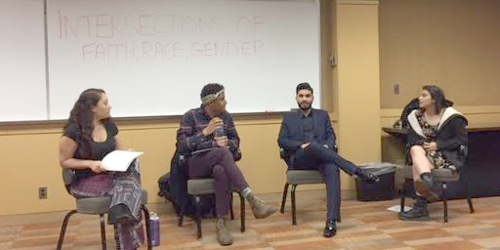BY EVE KUCHARSKI

Intersections between Faith, Race, Gender and Sexuality panelists. Pictured left to right: Nicole Bravo, Leon Hister, William Alexander III, Heba Afaneh. BTL Photo Eve Kucharski
Faith and sexuality are rarely mentioned together. In fact, it is not uncommon that the two topics are viewed as entirely separate. Pair those topics with a discussion of race and for many they become inaccessible. Some of those barriers were broken on April 13 at The Kellogg Hotel & Conference Center in East Lansing during an undergraduate panel.
"It's always a good opportunity to be able to come and share that story and first of all demystify what it is to be queer, what it is to be a person of color and move beyond that as well to what are the implications for people," said Nicole Bravo, a second-year graduate student and assistant for the Michigan State University LGBT Resource Center. Bravo has attended the panel several times.
Bravo, who was one of four panelists at the "Intersections between Faith, Race, Gender and Sexuality" event, spoke about her experiences with, divergence from and her process of recovery after being part of the Catholic faith.
"Growing up I went to Catechism and Sunday school and was involved in youth group. I was a 'but Catholic.' I believe this 'but' I don't believe that there's anything wrong with …," said Bravo. "The breaking point was when I dated my first trans partner. That was the point that I could no longer reconcile the two."
Bravo's insight and experiences were accompanied by that of Leon Hister, Heba Afaneh and William Alexander III – each MSU students who shared traditionally conflicting stories about sexuality, faith and race.
But those were just some of the topics covered April 13 at MSU's "Race in 21st Century America: The 10th National Conference." Post each presenter's introduction, the floor became an open forum for audience members to pose questions on anything from an explanation of pansexuality, to broader queries about the intersectionality of those identities.
Panelist Hister, a senior and dual major in philosophy and social relations spoke about his own experience as a member of the queer community as well as his own understanding of his biracial identity and the process of gaining confidence within it.
"I think that really truly we don't do this often enough, we second-guess what we know," Hister said.
Taylor Schaar, a student affairs employee in a program outside of MSU attended the event to aid her in her work and found the presentation insightful.
"I think that there are a lot of structures in predominantly white institutions that reinforce oppression, even if students who have marginalized identities are given access to education," Schaar said. "I think that that is something that people aren't really willing to examine because it's uncomfortable."
That push out of the comfortable set the tone of the panel, but the tension was outweighed by the positive emotion that filled the room post panel. First year masters graduate student and panelist Alexander summed up the goal of the presentation.
"When a student is from a privileged identity (learning about these identities), they're going to be upset, but at the end of the day you have to be unapologetic about that," Alexander said. "But also open to working with those students to help them learn and grow as well."
For more information about the MSU LGBT Resource Center, visit the website, check it out on Facebook or follow the organization on Twitter.










